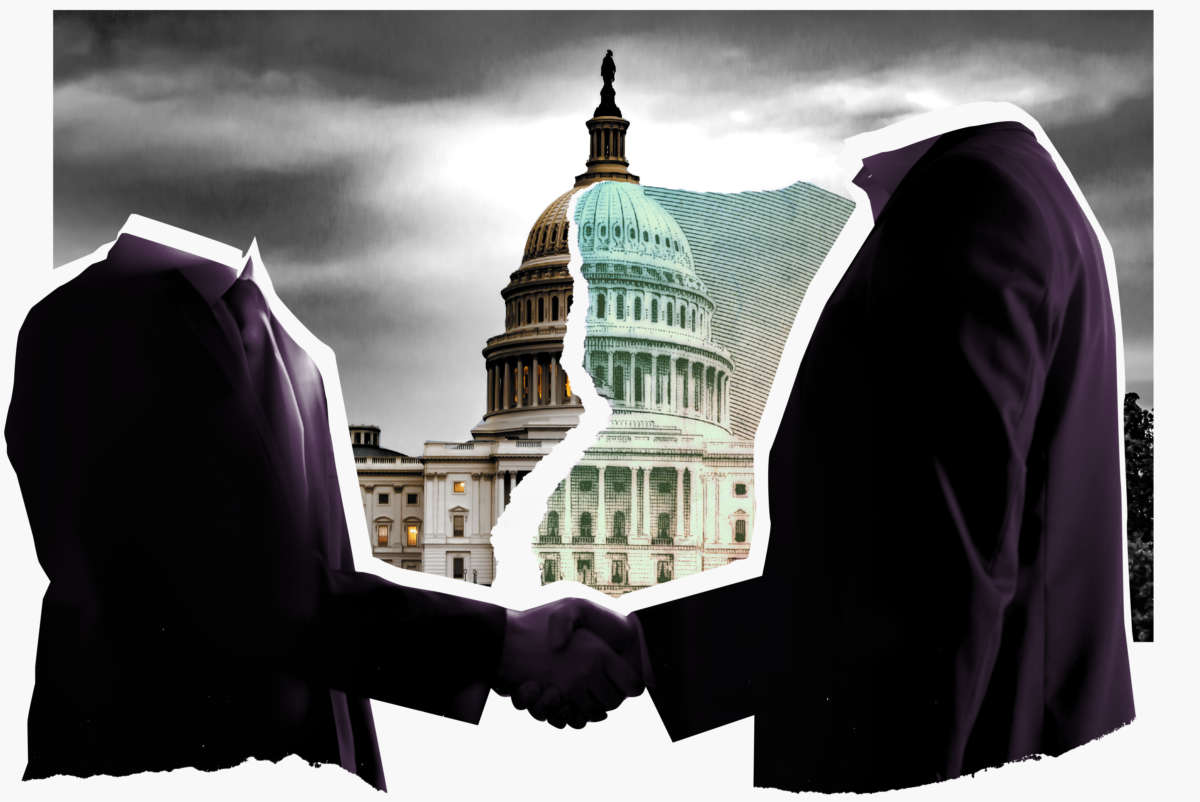A new report by Public Citizen has found that the 55 corporations that paid zero dollars in federal income taxes in 2020 spent a combined nearly $450 million in lobbying and campaign contributions over the past three election cycles.
Since 2015, the 55 large corporations, including companies like FedEx and Nike, have spent $408 million in lobbying and $42 million in campaign contributions, Public Citizen finds. On average each year, the companies collectively send 526 lobbyists to D.C. in attempts to influence federal lawmakers. Only eight of the companies in the analysis didn’t disclose any spending on lobbying in this time frame.
Of these corporations, FedEx spent the most over the past years, shelling out $71 million on lobbying and campaign donations since the 2016 election cycle. FedEx is closely followed in spending by Charter Communications, which operates internet and communications company Spectrum, at $64 million. The two companies were similarly the top spenders in the group for the 2020 election, spending over $20 million each.
Of the political contributions, Republicans were more often on the receiving end than Democrats. Twenty of the top 25 officials who received contributions from these companies were Republicans — though moderate House Majority Leader Rep. Steny Hoyer (D-Maryland) received the most at $408,000.
The companies, Public Citizen finds, also contributed millions to super PACs and party committees. This makes sense, Public Citizen explains, because “these committees can accept unlimited amounts compared to the campaign committees and leadership PACs of elected officials.” Among the top six recipients, four are affiliated with Republicans — the House and Senate Republican national committees, the Republican National Convention host committee and a Republican-aligned Super PAC.
The top two Democratic organizations, the House and Senate committees, together received about the same amount as the top receiver, the National Republican Senatorial Committee (NRSC). The Democratic committees hauled in about $1.45 million, while the NRSC received $1.3 million in the last three election cycles.
Evidently, the lobbying and contribution efforts pay off quite literally for these corporations. Though it’s unclear exactly what they’ve lobbied for, earlier this year, the Institute on Taxation and Economic Policy (ITEP) found that these companies paid zero dollars in federal income taxes in 2020 — less than the vast majority of the American public, most of whom make far less than these companies do in profits.
Meanwhile, those companies made back far more than their nearly $450 million. ITEP found that these companies not only paid nothing in federal income tax, they also received billions in tax rebates — meaning, with $8.5 billion in avoided taxes and $3.5 billion in rebates, they came out ahead by $12 billion. That’s over 26 times their lobbying and political contribution “investment,” in just one year.
“The corporations keep winning while the American public loses,” Public Citizen concludes. By tax time, “these corporations have used every break and loophole on the books to ensure their pockets have nothing left but lint. But when it is time to influence federal policy, they find a whole bunch of money under the mattress. Adding insult to injury, the federal government shovels money back out to these companies that pay zero in corporate taxes in the form of rebates, money they can turn around and spend to influence policy for decades to come.”
Indeed, part of what’s frustrated progressives about corporate and wealth taxes of late in the fact of new revelations is that the most egregious examples of tax avoidance are completely legal. “Outrageous,” said Sen. Bernie Sanders (I-Vermont) on Twitter. “We must get big money out of politics and create an economy that works for all of us, not just the top 1%.”
The 55 corporations that avoided paying federal income tax in 2020 used loopholes and low statutory rates set by the 2017 Republican tax cuts. Those same tax cuts likely also helped super wealthy people like Jeff Bezos and Elon Musk avoid paying all taxes altogether in some recent years, though tax loopholes established before 2017 probably contributed as well.
Join us in defending the truth before it’s too late
The future of independent journalism is uncertain, and the consequences of losing it are too grave to ignore. To ensure Truthout remains safe, strong, and free, we need to raise $46,000 in the next 7 days. Every dollar raised goes directly toward the costs of producing news you can trust.
Please give what you can — because by supporting us with a tax-deductible donation, you’re not just preserving a source of news, you’re helping to safeguard what’s left of our democracy.
